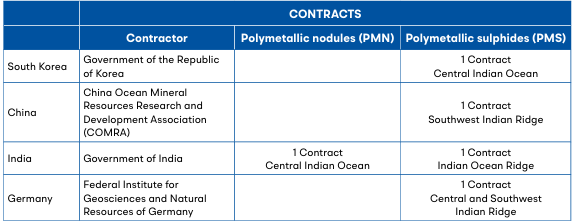Planetary Security Initiative Policy Brief, November 2025
Deep-sea mining (DSM) is a novel way of extracting minerals from the bottom of the ocean, with commercial mining expected to begin soon. Currently, only exploratory licences have been granted. However, this emerging method of mineral extraction is already making waves. DSM is believed to pose geopolitical and environment risks to the Indian Ocean’s fragile marine ecosystem and resource-dependent coastal communities, with potential consequences for fisheries and biodiversity. The practice could risk depleting fish stocks and exacerbating illegal, unreported, and unregulated (IUU) fishing in the Indian Ocean. As nations from the Indian Ocean and beyond compete for critical minerals, which are essential components in modern technologies and renewable energy, geopolitical tensions could potentially rise and complicate regional cooperation under frameworks like IORA and BIMSTEC.

Given the accelerating push for commercial DSM operations and an uncertain regulatory framework under the International Seabed Authority, this policy brief examines the geopolitical and climate implications of DSM with a focus on global trends and developments in the Indian Ocean, with an emphasis on India and Sri Lanka.
Key policy recommendations include:
- Strengthening Domestic Regulations and Environmental Safeguards for Responsible Deep-Sea Mining:
Countries aiming to engage in DSM should establish strong domestic frameworks to mitigate environmental harm, aligned with the evolving ISA Mining Code. Indian Ocean littoral states must prioritise rigorous environmental impact assessments, continuous monitoring and strict ecological safeguards. A science-based, precautionary approach is essential to balance economic interests with marine biodiversity protection. - Advancing Regional Governance and Scientific Cooperation for Sustainable Deep-Sea Mining:
Regional coordination is crucial to prevent unsustainable exploitation of marine resources. Platforms under IORA and BIMSTEC should promote transparency, data exchange, and joint environmental assessments. Shared research on deep-sea ecosystems, fish stocks, and regional monitoring mechanisms would strengthen accountability and minimise cross-border disputes while enabling Indian Ocean nations to align resource development with long-term environmental sustainability.
A balanced approach to DSM requires coupling innovation and economic ambition with strong environmental governance. By strengthening domestic laws and enhancing regional cooperation, Indian Ocean states can ensure that the pursuit of critical minerals supports and not undermines the region’s ecological and geopolitical stability.
Read the Policy Brief using the link here.
This policy brief is published by the Clingendael Institute in collaboration with the Institute of Peace and Conflict Studies and is written by Nicholas Weng-Lam Chu.



